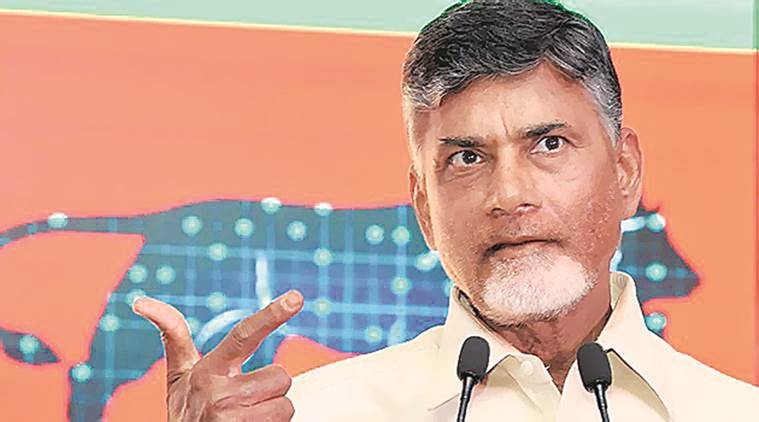Delhi theatre, Andhra politics
Recent no-confidence motion was an opportunity for TDP to cover up governance failures and blame rivals.

Andhra Pradesh Chief Minister N Chandrababu Naidu.
After an unsuccessful attempt in the budget session, the Telugu Desam Party (TDP) succeeded in moving a motion of no-confidence (NCM) against the BJP-led NDA government in this session of Parliament. The party sought to use the opportunity to underscore the unhelpfulness of the central government, of which it was a part until a couple of months ago, towards Andhra Pradesh. Unfortunately, the Congress President Rahul Gandhi’s hug, wink and the so-called message of politics of love cornered most of the attention.
So what exactly did the TDP achieve? In “majoritarian” parliamentary systems like ours, the executive is an incredibly powerful entity vis-a-vis Parliament. As long as the government of the day has the numbers, there is very little the Opposition can do. Barring its adversarial stance, the Opposition is reduced to being reactive and can at best only embarrass the government. While there other procedural devices available to the Opposition to check the government, including question hour, calling attention motion, censure motion, adjournment motion and so on, the NCM is the only device that unmistakably seeks to remove the government. However, comparative studies tell us that the odds of an NCM succeeding are significantly lower than the odds of failure. So why do political parties play a game they know they will lose?
If politics is theatrical and relies on spectacle and performance, nowhere is it more apparent than in an NCM debate. It has other strategic uses beyond terminating governments. Opposition parties use it for both short-term and long-term gains. The immediate short-term benefit is immense publicity. The media coverage that accompanies the NCM begins much before the actual event and concludes with a post-mortem examination. No political party is likely to pass this opportunity for free promotion.
When an NCM is used in the latter half of a Parliament’s term, Opposition parties have a relatively long-term perspective in so far as they anticipate electoral returns in the next election. The assumption is that by highlighting the government’s incompetence, they hope to sway voters from the government side to their side. For the government, it is an opportunity to reiterate its commitments, detail the successes and explain away the insufficiencies.
Though the Lok Sabha provided the space for the spectacle, the audience for the TDP and the real politics was in distant Andhra Pradesh. Likewise, though the BJP and the central government were portrayed as the primary villains, the actual target was the YSR Congress Party (YSRCP), the principal opposition to the TDP in the state.
In 2014, the TDP hoped that with “all possible help” promised by a friendly government at the Centre, its grandiose vision which included, making it one of the top three states by 2022, the most developed state by 2029 and the best investment destination in the world by 2050, could be fulfilled. However, with a less-than-helpful central government, led by a party which has its own ambitions, the government in the state was almost always short of resources.
With elections round the corner, the TDP, therefore, went for broke and played its ace as many contenders were snapping at its heels. One one hand, there is the spectre of anti-incumbency and the two state-based parties, the YSRCP which was gaining traction as a result of Jaganmohan Reddy’s ongoing state-wide padayatra, and the Jana Sena, led by the unpredictable “power-star” and joker in the pack, Pawan Kalyan. On the other hand there is the BJP, which has the goal of strengthening and expanding its presence, while being open to alliances with the others.
At the core of the TDP’s argument in the debate was the non-fulfilment of the six assurances including special category status (SCS) made by the then prime minister, as well as the various projects mentioned in the Andhra Pradesh Reorganisation Act 2014. The party also argued that the so-called special package that was offered by the Centre in place of the SCS was nothing special since it did not provide similar benefits. For the TDP, the NCM was an opportunity to make up for the lack of delivery in the state and apportion the blame on others. The party aimed to demonstrate that while it was willing to do anything to build a new Andhra Pradesh, it was let down by others who could have made a difference.
The TDP specifically targeted the central government as well as the two polity-wide parties, the BJP and the Congress, as being responsible for the misery of the state. The party also slipped in federalism and centre-state relations for effect. Prime Minister Modi as well as the BJP president were singled out for special attention. The party argued that Modi’s campaign against corruption was hollow since it was supporting the corrupt in the state and elsewhere, apparently hinting at the tacit understanding between the YSRCP and the BJP. Most importantly, the debate provided the TDP with an opportunity to reiterate its commitment to the growth and development of Andhra and deny the YRSCP the halo of the martyr as well as the space to portray itself as the true representative of the state.
The BJP may gloat over the immediate effects of the defeat of the motion and call the Opposition “immature” for tabling it despite not having the numbers. However, the party ignores the fact that holding the government accountable is the primary function of the Opposition. It is for the Opposition to decide on what issues to raise, which mechanism to use and when it should be used. While the institutional milieu may be loaded in favour of the executive, the NCM despite the high probability of failure, nevertheless offers the Opposition a small window of opportunity to pull something back.
The writer is with the department of political science, University of Hyderabad
For all the latest Opinion News, download Indian Express App
More From K K Kailash
- Anatomy of an uncouplingFor TDP, caught between a BJP keen to expand in Andhra Pradesh and the YSR Congress emerging as a rival, leaving the NDA may have…
- Drama in the hillsUttarakhand shows how BJP promises of cooperative federalism, ‘Congress-mukt Bharat’ sit uneasily together...












































No hay comentarios:
Publicar un comentario